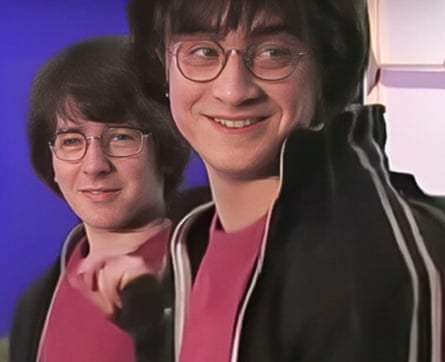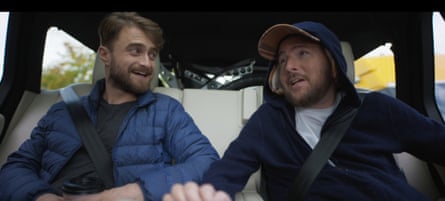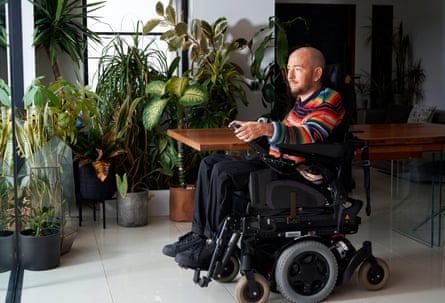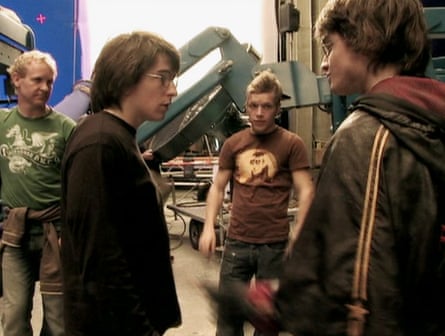T
The routine had been previously practiced. Harry Potter was supposed to be thrown by Nagini the snake. And that’s exactly what happened. David Holmes, who doubled for Daniel Radcliffe, felt the impact and it was painful. But that’s just part of being a stunt performer. He was constantly getting injured and displaying new bruises.
The following day, the team returned to refine the routine. However, it still did not meet their expectations. To improve it, they resorted to their tried and tested method of increasing the weight on the pulley system that would propel Harry at a higher speed through the air.
14 years later, Holmes recalls that he immediately realized he had broken his neck and was fully conscious after hitting the wall with great force. He was left flailing like a puppet with no strings. His boss, stunt coordinator Greg Powell, asked him if he could feel his legs and unfortunately, he could not. This fateful day not only changed Holmes’s life forever, but also impacted the lives of many others on the set of Harry Potter and the Deathly Hallows: Part 1. Powell had to live with the mistake, Holmes’s best friend Marc Mailley had to take over as the stunt double, and actor Daniel Radcliffe, who was trained in gymnastics by Holmes and looked up to him, was also affected. And the ripple effects continued.
Later on that same day, it was reported that an incident had occurred during the pre-production stage on the set of Harry Potter. Dan Hartley, who was then a junior member of the crew working as the video playback operator, recalls seeing the news report on television. He immediately contacted one of his colleagues who informed him that Dave, a fellow crew member, had been involved in a serious accident. Over the next few days, they exchanged messages and discovered that Dave had become paralyzed. Hartley had been working with the team for almost ten years and was deeply affected by the news. Within a month, they were back on set, trying to adapt to this new reality, which was incredibly difficult. Dave had been a close friend and colleague for many years, and his absence was deeply felt. However, the production continued without him, and it was a loss that was keenly felt by all.
The cast of Potter considered themselves to be like a family. Most of them had been working together since the first film, Harry Potter and the Philosopher’s Stone, was made in 2000. They held a special place in each other’s hearts, especially Holmes, who had been part of the group since the very beginning. Despite his small stature at only 5ft 1in, he was full of mischief, energy, and exceptional skills.
Hartley recalls that he was similar to a mascot for us. At the time of the first film, he was only 17 years old and had a mischievous and confident personality. As everyone on set was growing up, with the kids starting at 11 or 12 and Dave at 17, and myself at 25, Dave’s larger-than-life but also small presence drew a lot of attention and fondness. He was well-known and adored by all. He wasn’t the soulful person we see now, but rather a young guy from Essex who had achieved success.
After the initial reports of the accident, there was little news about David Holmes. There were no dramatic consequences, public accusations, or high-profile legal disputes. Holmes quietly – and sometimes not so quietly – worked towards rebuilding his life. Today, at 40 years old, he is paralyzed from the chest down and relies on four full-time caregivers. He has gained wisdom and a calmer demeanor, but in other ways remains unchanged. Meanwhile, Mailley has become one of the world’s most well-known stunt coordinators, while Radcliffe is one of the rare child stars to achieve success as an adult. As for Hartley, he is now a film director and has recently released a documentary about Holmes titled “The Boy Who Lived.”
I meet Holmes at his home in Leigh-on-Sea, Essex. The house would make the perfect setting for a futuristic sci-fi movie. Doors open and shut, lights switch on and off, a lift rises and descends at his command. “I designed the house in my head when I was on the spinal ward,” he says. “The technology I’ve put in place gives me as much independence as possible.”
Holmes was raised in Essex with two brothers, and his father serves as a deacon at their local Baptist church. His mother dedicated her career to working with disabled children. Despite his active upbringing, Holmes jokingly recalls how he managed to break his neck. At the age of five, a team from British Gymnastics came to his school to assess the students’ potential. It was discovered that all three Holmes boys had great flexibility and skill. As a result, their mother enrolled them at Havering Gymnastics Club, which not only acted as a great babysitter but also helped to channel their energy effectively.
David, who was a skilled gymnast, developed a strong passion for the sport at a young age and considered it to be the best in the world. By the time he was 13, he was competing in national events and had aspirations of representing Britain in the Olympics. However, he faced bullying at school due to his small stature. Being small made him an easy target for name-calling and being stuffed into lockers. Fortunately, gymnastics provided a safe haven for David as he was surrounded by other gymnasts who shared a similar size.
A year later, Powell, a renowned figure in the stunt industry, spotted him and offered him a job on Holmes’s debut film, Lost in Space, which featured famous actors like Gary Oldman, William Hurt, and Heather Graham. He was hired under a child performer’s contract and served as a stunt double for the character Will Robinson. He had to maneuver through exploding pyrotechnics while wearing a rubber suit designed to resemble cryogenics. This experience surpassed his previous love for gymnastics. At the age of 14, he was given the opportunity to freely roam and explore Shepperton Studios during the summer, which was a thrilling experience. What he observed was that once he stepped onto the film set as a child performer, he was treated like an adult. This solidified his desire to become a stuntman.

In 2000, three years after, he became a professional and started working as a stunt double for Radcliffe in the Harry Potter movies. For Holmes, this job was even better than Radcliffe’s. “I get to embody a character without the same pressures that actors face. I can use my gymnastics skills to add to the story.” He was well-compensated for a glamorous job that he enjoyed and was considered a star in his own field, all while maintaining his anonymity. It was a win-win situation.
The Potter family, consisting of Greg, Holmes, Mailley, and Radcliffe, were a close-knit group. Greg acted as a father figure to Radcliffe from the age of 14, and Radcliffe considered himself a member of their extended family. Holmes and Mailley were inseparable, and Radcliffe grew close to them as well. Initially, Holmes was only Dan’s PE coach, but they soon formed a strong bond. They would often spend time in the stunt office, where Holmes would let Radcliffe be a kid and do activities like jumping off Portakabins onto trampolines or practicing judo, boxing, and sword fighting. During the first two films, Radcliffe was like a little brother to Holmes, but by the third film, they had become best friends. However, their close relationship came to an abrupt end.
Holmes noticed that there was something off about the rehearsal the previous day. Mailley suggested that he should take over for Holmes the next day. However, Holmes refused, determined to perform the stunt himself, even if it meant enduring another hit. Mailley reassured him that it wouldn’t be as bad as the day before, as they were using an outdated and now banned method of wire flight with weights. This method was responsible for a major accident on a film set, leading to its ban across major studios. Despite the previous day’s rough rehearsal, they decided to push the limits even further on the second day, constantly striving for more intense and daring stunt action.
Did the stunt coordinators use additional weights on the pulley mechanism to increase the intensity of the action? “Yes. I won’t provide any further information. The consequences of my accident ensure that no one will be placed in that circumstance again. And that’s satisfactory for me. It’s now much more advanced and regulated.”
Was he aware of the danger at the time? “I hope it’s okay, but I don’t want to relive the worst day of my life again. Is that alright?” he says softly. “Luckily for me, because of this movie, my on-screen legacy is not just me crashing into that wall 14 years ago. Hopefully, people will find some positives in the way I handled it with grace – even though all my dignity was taken away.” Among other things, the accident caused him to suffer from severe PTSD. “I would hear the sound of my spinal cord crunching in my head as I tried to fall asleep.”
When faced with overwhelming emotions, Holmes turns to humor as a coping mechanism. “I have plenty of jokes in mind, but I’ll spare you,” he says. Encouraged, I urge him to share. “Well, there was this one time when Voldemort hit me with a spell – Wingardiumquadriplegia,” he chuckles. “It’s quite a clever joke. I’ve always thought about performing at the Edinburgh festival.”
He recalls being a stuntman and acknowledges that he was well aware of the risks involved. Despite being paralyzed in the hospital, he began to feel fortunate. He was placed in a ward with two boys, one who had been injured in the Mumbai terrorist attack and is now a close friend, and the other who was stabbed and urinated on because of his sexual orientation. He reflects on meeting these real victims and recognizes that while it was not his fault, he chose to take on the dangerous job and therefore had to accept the potential consequences. He believes that no stuntman should ever take on such a job without fully understanding and accepting the risks involved.
Holmes shares with me his fortunate circumstances – owning a house, receiving enough money from insurance, and having amazing friends and support. However, he is aware that in the grand scheme of things, he is far from lucky. He seldom speaks publicly about his experience and how it has altered his life, but today he makes it known that he does not wish to sugarcoat anything. He advocates for those who have faced spinal cord injuries, and as part of his advocacy, he reveals to the world the reality of living with such an injury.
“Would you like to hear a story about hitting rock bottom?” he asks with a mischievous grin. I don’t think I have a choice, I reply. “It’s a really good story!” he promises. He begins with an explanation – some people with spinal cord injuries experience involuntary priapism (prolonged erections). “I had a suprapubic catheter, which is a tube inserted into your bladder through a hole in your abdomen. My parents had learned how to transfer me in and out of bed using a board. One day, my mom transferred me into bed and I asked her to change the dressing on my catheter. I couldn’t see what was happening because I was lying on my back, so I used the bed remote to adjust the angle and saw my mom pushing my erection out of the way while my dad struggled with the dressing. That’s when I realized I had hit rock bottom! These erections can last for hours and often happen at the most inappropriate times. My longest one lasted eight hours.”
He claims that it is unpleasant in every aspect. “If you remain standing for too long, you may have to be hospitalized due to the risk of developing deep vein thrombosis. Therefore, they administer an injection to lower your penis.”
He feels it is necessary to share this story with me, not to amuse me, but to demonstrate the challenges of living with his injury. Some time ago, he had an encounter with Margot Robbie on the set of Barbie. He tells this story with great enjoyment. “It was not a good day to wear matching cashmere pants. I was so worried! I kept thinking, please don’t, please don’t … I used my injured arm to cover my lap just in case.”
At first, following the incident, he had some use of both arms. However, currently only his left arm is functional and there is a risk that he may also lose use of it. Holmes suffered a complex neck injury due to a cyst in his spinal cord, leading to continuous deterioration.
Holmes was able to adapt to his disability in a remarkable manner. Despite being confined to a hospital bed, he was able to design his new home and provide comfort to his loved ones. He even had a positive attitude towards his situation, telling his mother that being angry or bitter was pointless. He also had praise for Warner Bros, the studio behind the Harry Potter films, for their actions. He specifically mentioned Roy Button, the head of physical production who had previously reprimanded him, for coming to his bedside and reassuring him that there was a process in place and that he would be okay. Holmes appreciated having someone in a position of authority offer support during this difficult time.

Was he already concerned about his financial future? “Well, I had just signed the mortgage and was starting to own a home. Life was moving forward.” He had moved in with his girlfriend at the time. However, the relationship did not work out. “Everything changed. A spinal injury affects every aspect of your life. Nothing is the same.” He takes a moment before continuing. “Except for one thing – watching movies. That remains the same, so I watch films.”
What was the most difficult thing to come to terms with? “It was all challenging. It was heartbreaking for me to not be able to return to working on Harry Potter. I wanted to see the story through to the end. I had read all of the books and imagined the action sequences. It was devastating. The book behind you even has my Post-it notes from when I read it and thought, ‘That’s a stunt I might be doing.’ I could envision the character and the stunts I would perform. No one else in the world had that, only me. All I wanted was to go back to work.”
Although he was aware that he could no longer return to work, he refused to come to terms with the fact that he had to adjust his lifestyle following the accident. He describes the time after the accident as a “lost decade,” but then realizes that “lost” doesn’t accurately capture the essence of that period. “It was a decade filled with extravagance and enjoyment. I wasn’t mature enough at the time.” The adrenaline rushes he used to seek by setting himself on fire and jumping off buildings, he now sought through other means. For example, he would take groups of people to Ibiza and spend thousands of pounds. He traveled the world, drove fast customized cars that he could control with his hands, and indulged in parties, alcohol, and drugs. “I was lucky to have those experiences, but I wasn’t truly facing my disability. I was putting it off and not accepting the life-changing impact it had on me.”
“The Boy Who Lived” is a poignant exploration of the devastating impact of an accident on Holmes’ life and those around him. Greg Powell, a skilled and tough man from a family of boxers and stuntmen, was at the peak of his career when the accident occurred. In a particularly emotional scene in the film, he admits to feeling responsible for causing Holmes’ injury and hindering his ability to live his life to the fullest. He tearfully expresses his regret for being the last person to touch Holmes when he could walk and the first person to touch him when he couldn’t.
Bypass the advertisement for the newsletter.
after newsletter promotion
Was Holmes aware of how the accident affected Powell? “Yes, he carries that scar with him every day.” He speaks of his mentor with fondness. “Greg’s impact should not only be remembered for the stunt accident he was involved in through me. His legacy should also include the opportunities he created for working-class stuntmen and the groundbreaking action sequences he brought to the world, like Tom Cruise floating with sweat dripping in the first Mission: Impossible or our first broomstick flight.” And has Holmes become known for the accident? “Unfortunately, yes. It comes with the territory. But he continues to go to work and takes extensive precautions for safety, including double, triple, and quadruple checking, avoiding over-rehearsing stunts, and limiting the number of takes when someone is at risk.”

Is he still in contact with Powell? “Yes, we talk frequently. However, we are not as close as we used to be.” As he speaks, the water bottle he is holding slips out of his hand and falls to the ground. “I know that seeing me struggle with a water bottle can be a trigger for him.” Is this based on what Powell has told you or what you have observed? “It’s what I have observed. I can see it in his eyes when he watches me.”
Dan Hartley mentioned that during his interviews with individuals like Powell and Mailley, he noticed that they were still very emotionally affected by their experiences. He was impressed by their rawness and vulnerability, which was a stark contrast to the stereotype of male bravado.
B
Upon my arrival at his residence in Essex, Holmes informs me that Marc Mailley has also arrived and that he will let him in. I have started to suspect that Holmes possesses extraordinary abilities. When I inquire as to how he knows, considering there was no knock or doorbell, he bursts into laughter. He explains that he can see Mailley through the window. Holmes expresses his pride in Mailley, stating that he is one of the top action coordinators in the world and is currently collaborating with Tony Gilroy on the upcoming Star Wars TV series, Andor.
Mailley is a small and fit man, who recently got a black eye from a rugby injury that required stitches. He and Dave met when they were both 17 and out dancing at a club. They bonded over their love for dancing and Dave played a pivotal role in Mailley’s life. During a difficult time when Mailley had made some bad decisions and moved out of his home, Dave helped him turn his life around. They became roommates and Dave even trained Mailley to become a stuntman, which led to him getting a job on the movie set of Potter. They were inseparable for seven years, spending all their time together at work, at home, and even out clubbing. In the movie, Mailley’s emotions are raw as he talks about the tragic accident.
Today, he informs me that he has been undergoing therapy since. He shares, “When I opened up to the therapist about everything, she became emotional. She apologized and admitted, ‘I am sorry, this is not professional of me.’ I had just disclosed the details of Dave’s accident and how it had impacted our lives. My father was also battling cancer at that time, and then my best friend suffered a neck injury…” Mailley’s voice trails off. He reveals that he considered leaving the Potter film but was persuaded by Holmes to take over his role. He adds, “I only agreed because Dave asked me to. I had to decline another job I was offered – Robin Hood, starring Russell Crowe.”
Was it difficult to move forward after the accident? “Yes. I harbored anger towards my job, the film industry, and everything in general.” How long did this last? “A very, very long time. Sometimes, even now. I don’t believe I will ever fully come to terms with it.” Why did he hold the film industry responsible? “I was simply searching for something to blame.” Did going to work make him upset? “There were too many things that served as reminders. We went from seven years of pure joy, having the time of our lives and one of the best jobs in the world, to experiencing extreme unhappiness at work after Dave’s accident.”
Holmes is aware of the challenges that Mailley faced. “He had to change his hair color, put on the costume, and perform the stunt that caused my accident during rehearsal. My close friend had to take on the role of the stuntman. That was the harsh truth of the situation.”
Mailley remained in the stunt industry for approximately three years following Holmes’ neck injury. However, his priorities shifted as he became increasingly interested in stunt coordination and preventing future accidents. He played a role in developing a new technique that did not solely rely on weights to achieve the illusion of characters flying through the air. Mailley explained, “In order to continue working in the industry after Dave’s accident, there needed to be some benefit. For me, that benefit was making stunts safer, particularly in regards to that type of stunt.”
Could there have been any other incidents of a similar magnitude since then? According to reports, it is unlikely. However, Holmes shares a disturbing story about his colleague Olivia Jackson in 2015. While she was filming a scene for “Resident Evil: The Final Chapter” in South Africa, Jackson was riding a motorbike at high speed while a camera mounted on a crane was approaching from the opposite direction. Due to miscommunication, she collided with the camera at a combined speed of 60mph, resulting in severe facial injuries. This incident was classified as a road traffic accident and was not covered by the film company’s insurance policy. Holmes considers himself fortunate to work in the UK, where liability insurance is provided under organizations like the British Stunt Register, Equity, and major production companies like Warner.

Did he benefit from the accident? “Yes, greatly. I will always acknowledge that breaking my neck helped me become a better man. Absolutely, without a doubt.” However, he thinks that it’s only in recent years that he has fully embraced his disability.
There have been significant challenges throughout his journey. In 2019, he underwent four spinal surgeries and experienced a brain drain, causing his mother to fear for his life. He recalls being in immense pain and feeling apathetic. He even requested to not be revived and instructed his surgeon to let him go if complications arose. The combination of medication, pain, and irritability led him to feel hopeless. While he did not actively desire death, he was resigned to the possibility and felt content with his life thus far. Fortunately, the feeling of hopelessness did not last long, as he now grins at the memory.
He returned with a stronger fighting spirit and claims to have a lot on his plate and even more he wants to accomplish. He has produced 41 episodes of a podcast series titled Cunning Stunts, where he interviewed stunt performers with the assistance of his old friend Radcliffe. Holmes exudes a generous nature, much like Mailley, as he expresses his happiness in seeing Radcliffe, who is also a producer on The Boy Who Lived, grow and develop. “He’s like a son to me. I adore him and I am immensely proud of him. When I see his physical transformation, knowing that I played a small part in it brings me joy.” What does he mean? “Just look at him, he’s in incredible shape!”
Holmes is in conversation with JK Rowling discussing the inclusion of a wheelchair-bound wizard in the upcoming Harry Potter TV series. They then discuss the ongoing struggle to improve the quality of life for individuals like him. He expresses his personal desire, as well as that of thousands of other quadriplegics in the country, for a device that can assist with bladder function. This would involve a simple product that can be attached to a catheter and activated by voice command, allowing for easy emptying and closing of the catheter. Despite the availability of technology, Holmes has yet to find anyone willing to develop this idea further.
The individual also has a plan to establish a stunt studio that would provide opportunities for lower-income children to enter the industry. He acknowledges that he was fortunate to have Powell give him his initial break. In order to become a professional stunt performer in the UK, one must join the British Stunt Register and demonstrate exceptional abilities in at least six different sports. However, obtaining these skills without private coaching is nearly impossible. Holmes was an exception due to his earnings from working on the Harry Potter films as a teenager, which allowed him to pay for his own coaching. He believes that the current situation only allows for wealthier individuals to train for the stunt register. As someone from a more humble background, he was unable to afford such training. This poses a problem for stunt coordinator Marc, who struggles to find black boys to double for black actors due to the limitations of socioeconomic status. The individual’s ultimate goal is to eliminate this barrier and make it possible for individuals from all backgrounds to pursue stunt work. Despite the hefty price tag of 35 million pounds, he remains optimistic and has connections that could potentially help make his dream a reality.
Holmes has regained optimism due to his recent romantic involvement with Rosie. She was involved in a car accident at the age of 19, which left her with even greater disabilities than Holmes. Currently, she has a team of 14 individuals caring for her, as her needs are more intricate than his. Despite her challenges, Holmes describes Rosie as a beautiful and fully feminine woman. They initially fell in love through email communication, without even seeing each other’s faces. Their first kiss required the assistance of four people, but it was a meaningful and fulfilling moment for them both.
Next week, he will be visiting Rosie in Sheffield. This is his first relationship in 10 years. He had accepted that he would be single, but it seems that the universe has brought them together. He felt that he would be single because he never felt good enough or wanted enough by the able-bodied women he dated. However, Rosie makes him feel like a man and that feeling is priceless. Although he realized at 11 years old, while coaching younger children at the gym, that he wanted to have children, he and Rosie have decided not to have them. They do not want to rely on others to raise their children for them.
Holmes’s optimistic attitude is overshadowed by his poor long-term outlook. According to his doctors, he can only expect to live until the age of 65. This is a significant decrease in life expectancy. In addition, his surgeon has warned him that he may not be able to independently perform basic functions such as breathing, speaking, and swallowing. This is a difficult truth for Holmes to face. The constant pain he experiences is described as feeling like 10 elephants standing on his head. Due to the lack of muscle structure in his body, he longs to be able to do a simple handstand again. He believes that no amount of hardship could compare to the daily challenges he faces. This struggle is the ultimate test for someone who used to be so physically active.
He has the hope that the movie will portray his life realistically, both the positive and negative aspects. Is he satisfied with it? “I haven’t viewed it yet. I’m not prepared for that. I experience it every day, so I don’t feel the need to watch it. I know there will come a time when I’ll be confined to bed and won’t be able to leave, and that’s when I’ll watch the film.” Currently, he believes there’s no need to dwell on that future. “Why confront death? Just keep moving forward. Give him a good kick.”
Source: theguardian.com


